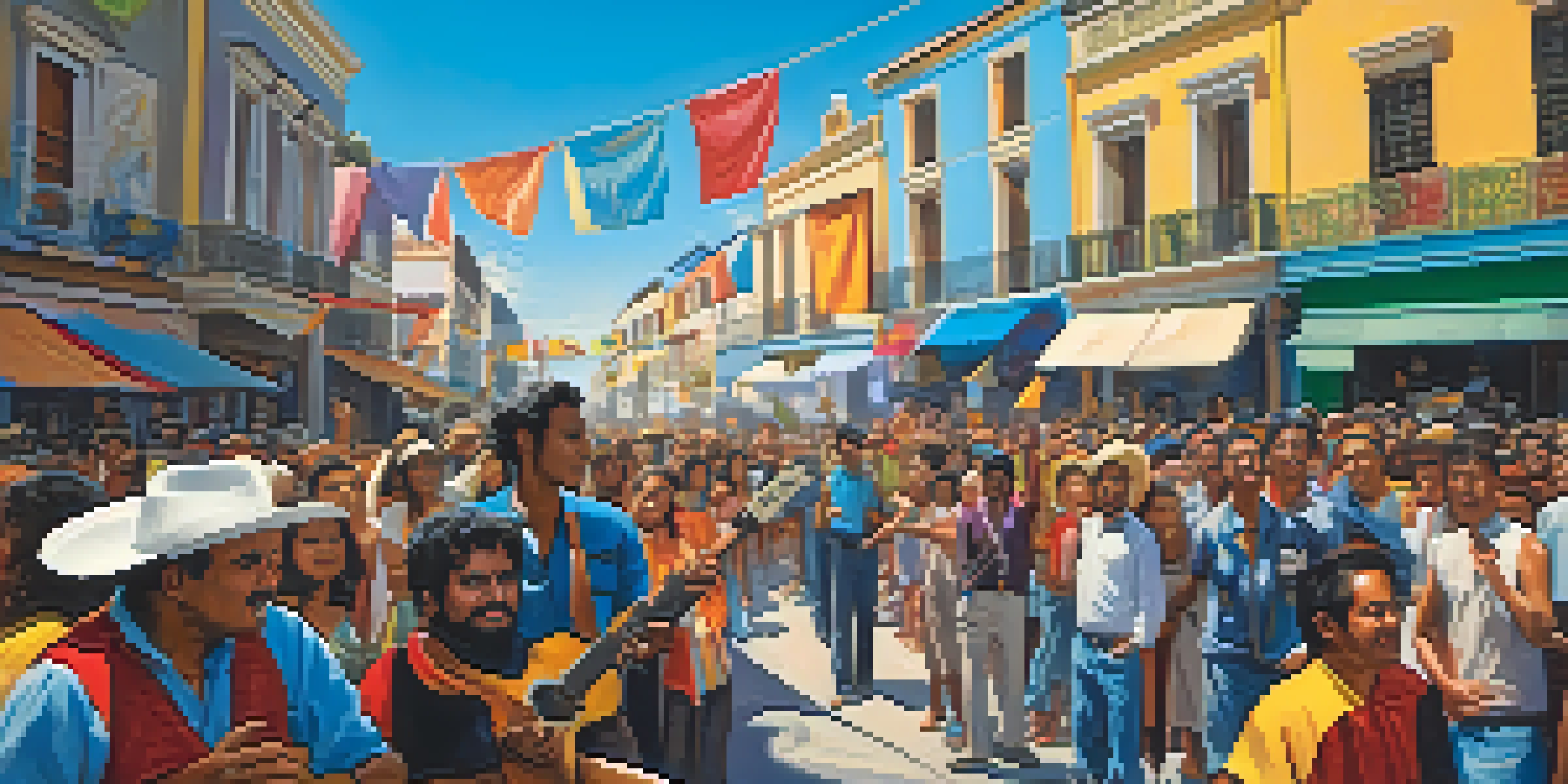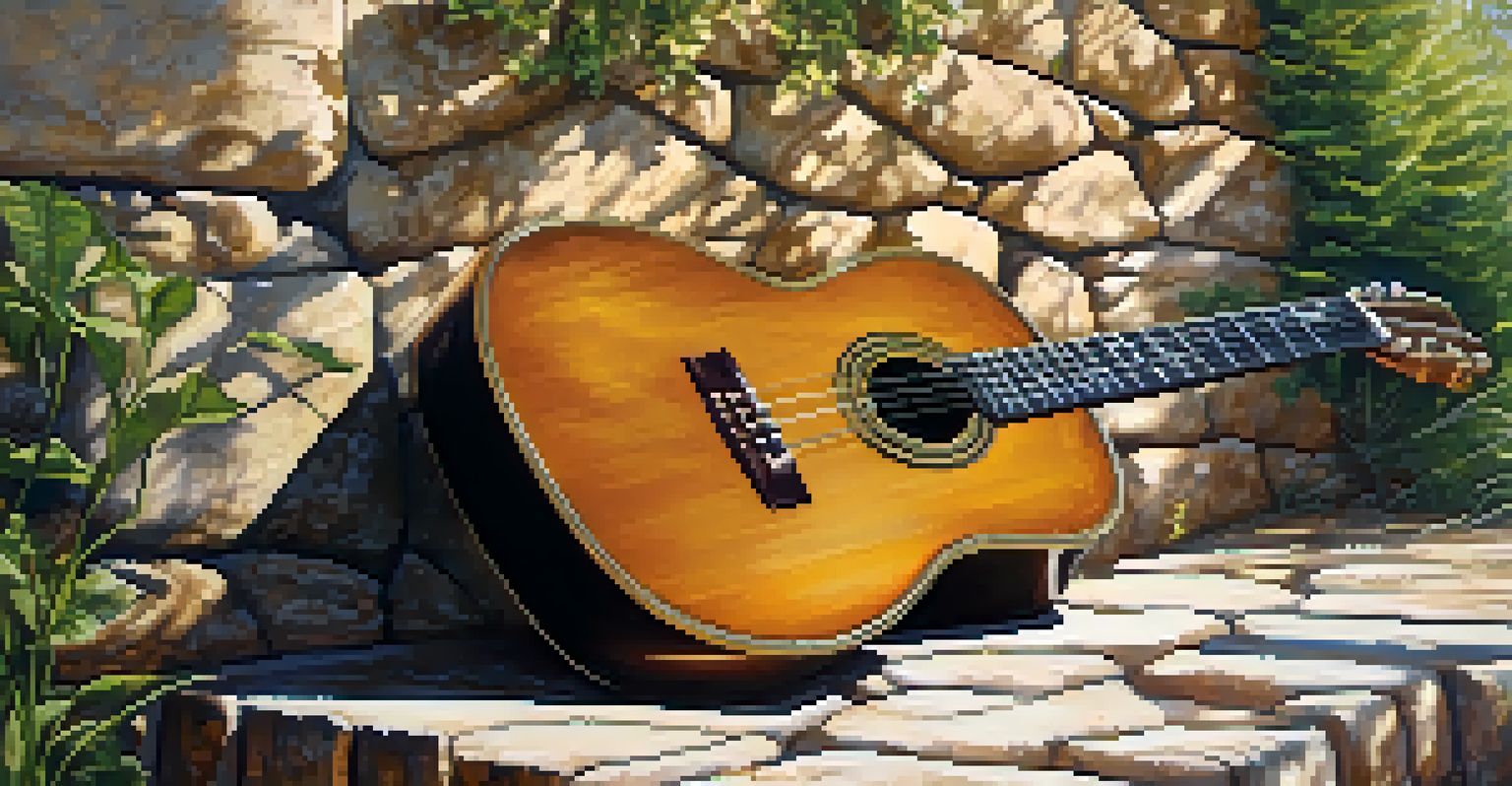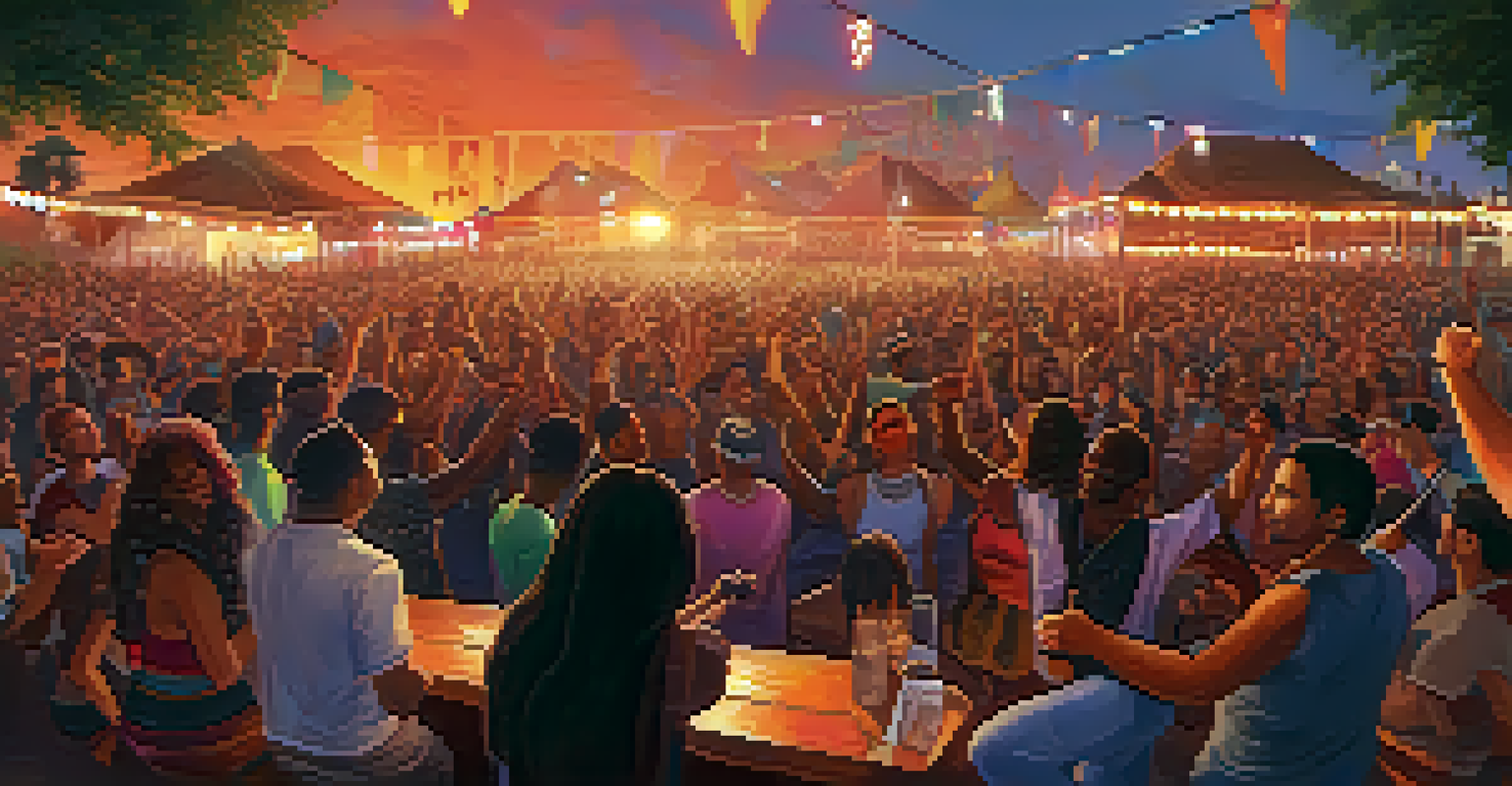Guitar in Latin American Revolutionary Movements

The Historical Context of Latin American Revolutions
Latin America has a rich history of revolutionary movements, particularly during the 19th and 20th centuries. These movements sought independence from colonial powers and aimed for social justice and equality. The tumultuous political landscape created an environment ripe for artistic expression, where music became a powerful tool for change. The guitar, an instrument deeply rooted in Latin American culture, played a significant role in these turbulent times.
Music is the weapon of the future.
As revolutions unfolded, music became a unifying force, rallying people around common causes. The guitar's versatility allowed it to adapt to various musical styles, from folk to protest songs, making it an ideal vehicle for revolutionary messages. This instrument resonated with the struggles of the people, echoing their hopes and dreams for a better future. Its strings captured the essence of resistance, turning melodies into powerful anthems.
Moreover, the guitar's presence in revolutionary movements highlights the intersection of art and politics. Musicians often became activists, using their craft to raise awareness and inspire action. In essence, the guitar became more than just an instrument; it transformed into a symbol of resilience and defiance against oppression.
Famous Guitarists Who Shaped Revolutionary Narratives
Throughout history, several influential guitarists have emerged as voices of revolution in Latin America. One notable figure is Carlos Gardel, whose tango music not only entertained but also reflected the struggles of the Argentine people. His emotive guitar playing and poignant lyrics resonated deeply, capturing the essence of a nation in turmoil. Gardel's music became a soundtrack for the revolutionary spirit, inspiring generations.

Another iconic guitarist is Victor Jara, a Chilean folk singer whose songs became synonymous with political resistance during the Pinochet regime. Jara used his guitar to tell stories of the oppressed, weaving together themes of love, loss, and hope. His tragic fate only amplified the impact of his music, transforming him into a martyr for social justice and human rights. Jara's legacy endures, reminding us of the guitar's power to ignite change.
Guitar as a Revolutionary Symbol
The guitar embodies the spirit of resistance and identity in Latin America, serving as a powerful tool for protest and cultural expression.
These musicians exemplify how the guitar can transcend mere entertainment, becoming a conduit for political expression. Their contributions illustrate the profound connection between music and social movements. The melodies they crafted continue to inspire new generations, proving that the guitar's strings can indeed strum the heartstrings of revolution.
The Impact of Folk Music on Revolutionary Movements
Folk music has always been a cornerstone of cultural expression in Latin America, and its role in revolutionary movements cannot be overstated. Rooted in the everyday lives of the people, folk music captures their struggles, stories, and aspirations. The guitar serves as a vital instrument in this genre, connecting individuals and communities through shared experiences. This connection is crucial during times of upheaval, as it fosters solidarity among those fighting for change.
The guitar is a miniature orchestra in itself.
During the revolutionary periods, folk musicians often took to the streets, playing their guitars to inspire and mobilize crowds. These performances became acts of defiance, using the power of music to challenge oppressive regimes. The simplicity of folk melodies made them accessible, allowing ordinary people to join in and participate in the movement. As a result, the guitar became a rallying cry for freedom and justice.
Furthermore, the fusion of folk music with revolutionary themes created a unique soundscape that resonated across borders. Artists began to blend traditional rhythms with contemporary issues, creating a rich tapestry of musical expression. This evolution not only preserved cultural heritage but also ensured that the revolutionary spirit remained alive and relevant.
The Guitar as a Symbol of Resistance and Identity
In Latin America, the guitar has transcended its role as a musical instrument to become a powerful symbol of resistance and identity. It embodies the spirit of the people, reflecting their struggles against colonialism, dictatorship, and social injustice. The act of playing the guitar is often seen as a form of protest, a way to assert one's identity in the face of oppression. This deep connection between music and identity fosters a sense of belonging and resilience.
Many revolutionary movements adopted the guitar as a visual and auditory emblem of their cause. Protest songs, often accompanied by strummed chords, became synonymous with marches and demonstrations. The guitar's presence in these events transformed the atmosphere, creating a sense of unity among participants. It served as a reminder that the fight for justice and equality was not just a political struggle, but also a cultural one.
Influential Guitarists of Change
Prominent guitarists like Victor Jara and Carlos Gardel used their music to reflect societal struggles and inspire revolutionary movements.
Moreover, the act of playing the guitar in public spaces can be viewed as an act of reclaiming one's heritage. For many communities, it represents a resistance against cultural erasure and a reaffirmation of their roots. In this way, the guitar has become a vital instrument in preserving cultural identity while simultaneously serving as a beacon of hope for future generations.
Modern Movements and the Evolution of Guitar Music
As we move into the 21st century, the guitar continues to play a vital role in contemporary revolutionary movements in Latin America. Today's artists are blending traditional styles with modern genres, creating a unique sound that resonates with younger audiences. These musicians harness the power of social media to amplify their messages, reaching unprecedented numbers of people. The guitar remains a central instrument in this evolution, bridging the gap between the past and the present.
Contemporary musicians like Residente and Ana Tijoux are using their guitars to address pressing social issues such as inequality, corruption, and climate change. Their lyrics often reflect the struggles of marginalized communities, creating a dialogue around these important topics. By incorporating the guitar into their performances, they pay homage to the rich musical heritage that has shaped revolutionary narratives in Latin America.
This modern wave of activism through music demonstrates that the guitar's power to inspire change is far from diminished. Instead, it has adapted and evolved to meet the needs of a new generation, proving that the spirit of revolution is alive and well. The guitar, as both an instrument and a symbol, continues to resonate deeply within the hearts of those who seek justice and equality.
Collaboration and Solidarity Through Guitar Music
Collaboration among musicians has always been a hallmark of revolutionary movements, and the guitar plays a crucial role in these partnerships. When artists come together to create music, they amplify their voices and messages, fostering a sense of solidarity. This collaborative spirit is essential in driving movements forward, as it encourages diverse perspectives and unifies individuals around a common cause. The guitar serves as a bridge, connecting musicians across genres and backgrounds.
One notable example is the Nueva Canción movement, which brought together various Latin American artists to address social and political issues through music. Guitarists like Mercedes Sosa and Atahualpa Yupanqui collaborated with poets and writers, creating a powerful collective voice for change. Their songs resonated deeply with audiences, inspiring activism and engagement on a broader scale.
Modern Music and Social Issues
Contemporary artists blend traditional guitar music with modern themes to address pressing social issues like inequality and climate change.
These collaborations showcase the guitar's ability to transcend boundaries, both geographically and artistically. By blending different musical styles and cultural influences, artists create a rich tapestry of sound that reflects the complexities of their struggles. This spirit of collaboration not only enhances the music but also reinforces the importance of working together in the fight for justice.
The Future of Guitar in Revolutionary Movements
As we look to the future, the guitar will undoubtedly remain a pivotal instrument in revolutionary movements across Latin America. With the rise of digital platforms and global connectivity, musicians have unprecedented opportunities to share their messages with the world. The guitar's adaptability allows it to evolve alongside changing cultural landscapes, ensuring its relevance in contemporary activism. This continued evolution is crucial for inspiring future generations to engage in the fight for social justice.
Moreover, the resurgence of interest in traditional music provides a foundation for new artists to explore their roots. Young guitarists are increasingly drawing upon the rich history of Latin American music, infusing it with modern influences. This dynamic blend not only preserves cultural heritage but also revitalizes the revolutionary spirit, reminding us that change is possible through creative expression.

Ultimately, the guitar will remain a powerful symbol of resistance, identity, and hope in Latin American revolutionary movements. As long as there are stories to tell and struggles to fight, the guitar will strum the chords of change, inspiring individuals to stand up for what they believe in. Its legacy as a tool for empowerment and unity will continue to resonate for years to come.